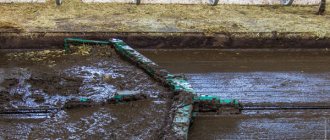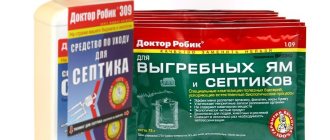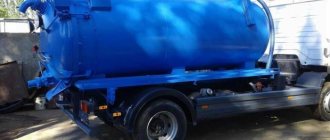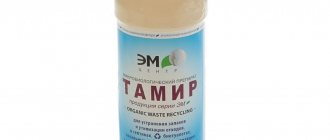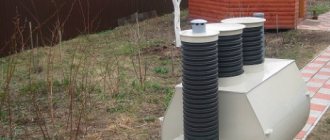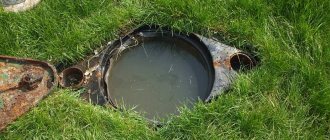One of the most pressing issues that owners of private houses have to resolve is wastewater disposal. But a properly selected product for cesspools can not only minimize the use of a sewage disposal machine, but also provide a garden with safe, high-quality fertilizer.
We will tell you which option will be optimal for the treatment facilities of your autonomous sewer systems. We describe in detail all the compositions used in practice, and evaluate their effectiveness. The information we provide will help you choose the optimal remedy.
Use of chemicals
Chemicals for cesspools are used for:
- promoting the rapid decomposition of organic waste;
- reducing the volume of sewage water and liquefying sludge at the bottom;
- getting rid of unpleasant odors.
But they are not recommended for use if the processed waste will be used as a soil fertilizer in the future.
General information about antiseptics
Antiseptics for cesspools are special preparations that are used for the prevention and cleaning of cesspools.
They are used to process sludge that accumulates at the bottom of the device, as well as to process liquid household waste and solid fractions. Ensuring the efficiency of the cesspool, they completely eliminate the problem of unpleasant odor, promote less frequent cleaning of the structure, remove pathogenic microbes and completely eliminate the possibility of harmful poisons and chemicals entering the external environment and into the bodies of people and animals. These funds are used in dachas and country houses if, for example, a brick cesspool is installed instead of a central sewer system.
Principle of operation
Cesspools need to be cleaned periodically, and how often it needs to be cleaned depends on the use. Sewage pits are cleaned in different ways: mechanical, biological, chemical. The last option is the most effective and simple. The principle of operation of chemicals is to convert soluble compounds using reagents into sparingly soluble ones. The main thing is that the chosen product is capable of reducing the volume of fecal matter as much as possible and can process paper, cellulose and filtered solids.
The most famous manufacturing companies ↑
From Russian and European manufacturers of chemicals for cesspools, here are several examples of companies that have long been recommended as suppliers of high-quality products for sewer cleaning:
- Reakor LLC is a large supplier of reagents and chemicals for any purpose, including consumer goods for cleaning cesspools of autonomous sewers;
- — specializes in the production and distribution of organic chemicals for cleaning cesspools and treatment facilities of autonomous and centralized sewer systems;
- — produces industrial and household chemicals, incl. and excellent products for cleaning sewer tanks;
- , France is the world's most famous supplier of organic and inorganic chemical products for cleaning drains;
- — mostly distributes environmentally friendly chemicals for treating sewerage facilities;
- , USA - is a major supplier of household and industrial chemicals, basing the production of its products on all kinds of laboratory tests.
By and large, such a list can be listed endlessly. After all, the market for care products for drainage pits or sewer tanks, such as, for example, a septic tank for a private home, is dominated by chemicals of organic and inorganic origin.
And, if aggressive inorganic chemicals are still actively used in the maintenance of centralized sewer systems, then in autonomous sewers they most often use cleaning of cesspools using bacteria or organic chemical compounds (for example, nitric acids).
Therefore, on the market for such consumer antiseptic products, you can most often find biological products for cesspools or drains.
Variety of chemistry, their pros and cons
Chemicals used to clean cesspools, depending on their active components, are divided into main subgroups:
- formaldehyde;
- ammonium salt compounds;
- nitrate oxidizers;
- bleaching powder.
They have many advantages:
- operate effectively at any temperature;
- easy to use;
- have a large assortment;
- are not afraid of aggressive impurities and hard water;
- have an affordable price.
As for the disadvantages, chemicals:
- have a negative effect on metal pipes and some types of plastic. With prolonged contact with chemical reagents, pipes begin to corrode;
- harmful to the environment, since under their influence steam and gases are released from cesspools;
- when released into the soil, they destroy beneficial enzymes and lead to the death of all living microorganisms;
- lead to the accumulation of pathogenic bacteria. In this regard, treated wastewater is prohibited from being used as fertilizer in the future.
Formaldehyde
Until recently, the use of foilmadehydes when cleaning cesspools was the most practical, affordable and convenient option. Now formalin is used only as a disinfectant, as it is toxic to people and the environment. Currently, formaldehyde is not available.
Ammonium salt compounds
Preparations made on the basis of ammonium salt compounds are characterized by a high degree of disinfection. They stimulate fecal matter to decompose and remove unpleasant odors. At the same time, they have a negative effect on the environment and human health. They are allowed to be used provided that the country toilet is located no closer than 20 meters from the house. If the waste pit is disinfected with ammonium salts, only vacuum pumping must be used.
Nitrate oxidizers
Compared to ammonium salts and formaldehyde, nitrate oxidizers (or nitrogen fertilizers) are considered more gentle. When using them, it is allowed to use decomposition products from sewage pits as fertilizers. They are environmentally friendly, neutralize specific odors, and transform the contents of cesspools into a homogeneous mass. But they are expensive and have a negative effect on metals.
Bleaching powder
Due to its affordable cost, bleach is widely used in the disinfection of cesspools and sewage pits. But this product is toxic to people. You must work with it very carefully (wearing gloves, a respirator, safety glasses), carefully following the instructions from the manufacturer. The powder must be stored in a dark and cool place. Since when exposed to sunlight, there will be a loss of active chlorine.
Range of chemical reagents
Until recently, formaldehyde, nitrate oxidizers, ammonium salts and bleach were considered the most popular preparations for waste disposal.
Chemical agent from the group of formaldehydes
The most affordable drug is considered to be any reagent from the formaldehyde group. A similar product is made from formic acid derivatives. In the production process of the products, a process is used to oxidize methane gas using a silver catalyst through high-pressure technology. The result is a chemical for cesspools that has antibacterial properties, as well as an antiseptic effect. Formaldehyde helps not only to destroy harmful microorganisms, but also to deodorize wastewater. But the formula of any such drug is a strong carcinogen. Just 10 grams of the drug can kill a living person, so at present such drugs are practically not used to solve these problems.
Nitrate oxidizers for cesspools
Nitrate oxidizers are expensive products that have a different principle of action. They, reacting with sewage, dissolve feces and transform their masses into a homogeneous structure, which is easier to pump out using a sewer truck. Nitrate oxidizers are safe for humans. Their high price is the only drawback. Only large utility companies can purchase such reagents. Therefore, ordinary consumers are forced to look for more affordable alternatives.
Ammonium agents can act as them; when they come into contact with sewage, they help evaporate foul-smelling fumes. But since science has not yet studied the issue of interaction of such reagents with the environment, experts do not recommend discharging purified water into the ground. According to the instructions, after disinfection and deodorization of cesspools using ammonium chemistry, it is necessary to call a sewer truck and transport the process water to city settling tanks.
Environmentally friendly drugs
Today, more and more often, sewerage installations are cleaned through the use of environmental biological products, such as, for example, a bioseptic tank, the packaging of which is shown in the photo. They are based on living bacteria and complex enzymes that eat organic matter and decompose sewage into fractions. As a result of the activity of bacteria, sewage breaks down into sludge. During the biopurification process, gas is formed (it is removed using ventilation) and water, purified by 70%.
Bioseptic for cesspools
The use of bioremediation, of course, is preferable, but it is not always possible to say unequivocally what will cope better with the task of processing feces and wastewater: chemistry or living bacteria. Each reagent has its own pros and cons of use. Let us outline the most basic of them.
Release form
According to the form of release, chemicals for outdoor toilets are divided into:
- liquid formulations. They are the most effective and cope with various contaminants. They are a ready-to-use solution. Their principle of operation begins immediately after being poured into the tank. The most popular products are: “Deo - Tural”, “Weist - Treat”, “Dachny - Aqua”;
- powdered products. Dilute with water according to the instructions and leave for 20 minutes, after which it is poured into the sewer. Experts recommend reducing the concentration of products when using them in metal containers;
- tableted. Convenient to use. The number of tablets used directly depends on the volume of the sewage tank. They destroy even the most persistent odors and dissolve most of the bottom sediments of a solid structure.
Reviews ↑
Sergey Anatolyevich, Rostov-on-Don We have been using French preparations such as Septifos Vigor for a long time to clean our drainage pit. Well what can I say. Over the course of 4-5 years, we notice a difference every time we infuse this drug into it. The remarkable work of this chemical is visible immediately after a couple of weeks, as it is written on the packaging. We like this tool. After all, it saves our time and reduces hassle.
Rosalia, Kemerovo I don’t know how biological agents work there, but we used chemicals to clean our cesspool. In general, we were not satisfied. Our expectations were beyond anything that could have been exceeded! They thought that the dirty waters would decrease, but they were at the same level and remained for about a couple of months. Yes, the smell was eliminated, all the garbage there was dissolved, but no further effect occurred. Still, we had to call a sewer truck and pump it out. Now we want to try more bacteria, they say they work better in this regard. Moreover, they are also safe for humans and nature.
Grigory, Moscow region We have a pit with an unconcrete bottom. A friend advised me to buy bacteria, saying that they would decompose sewage into sludge and water, and the water would go into the soil. So I bought these bacteria and used them for several months. And six months later I noticed that my friend was right. In fact, the water drained through the bottom of the hole, but the silt remained. I am happy with these bacteria, because now I have to pump out the pit less often. And don’t believe what others say about bacteria not working. I personally tested it on my drain pit.
Tatyana Petrovna, Kazan I consider means for the decomposition of wastewater in a cesspool to be an excellent solution in our modern times. My family has been using Vodogray for a couple of years now. This is a biological means for cleaning a cesspool. So we have adapted to them so well that after the bacteria have done their noble work, we take and place a fecal pump in the hole, and then pump it directly to the flower beds. I forgot to say: our pit is all concreted, a sewage disposal truck can’t get there, so we had to get creative somehow. In general, I was afraid to pour this on potatoes, but on flowers - this is the solution. And what do you think, my flowers grow like in the tropics! For example, I am very pleased that such bacteria were invented!
Popular products for cesspools
The most common septic tanks for outdoor toilets are:
- Doctor Robik. Available in powder or liquid form. Dissolves solid waste, chlorine, paper, soap residues. It is used during temperature fluctuations and is resistant to negative factors. The duration of action of the drug is 30 – 40 days.
- Vaist - Treat. It is used in open and closed toilets. Copes with chemicals, chlorinated water, detergents. Its contents (dry powder) are diluted in a container with warm water, infused for about half an hour and poured into a cesspool. Repeated treatment of the country toilet is carried out after 30 days.
- Septifos. Used in closed toilets, available in the form of granules. The drug eliminates unpleasant odors, removes waste residues on the bottom and walls of cesspools.
- Vodograi. Used for cleaning sewer pipes and toilets. Eliminates solid feces, odors and effectively cleans the walls and bottom of the pit from sludge.
- Happy summer resident. Used for cleaning drainage systems and cesspools. It contains microorganisms that convert waste into carbon dioxide.
- Sunex. Destroys fats, paper and waste products. Available in powder form. Can be used at any temperature.
- Deo – Tural. It is a liquid concentrate for cesspools with a disinfecting and disinfecting effect. It is used for mobile toilet cubicles, cesspools, bio toilets.
- Devon – n. Nitrate oxidizing agent used for cesspools. It is environmentally friendly, as it does not contain formdehydes, alkalis, acids or ammonium compounds. 50 ml of the product is diluted in 2 liters of water and poured into the pit. It is not afraid of frost, detergents, removes odors well, and liquefies fecal matter in cesspools.
Types of antiseptics for country toilets
- chemical preparations based on various components;
- bioactivators , the active agent of which is bacteria.
Antiseptics differ in their composition, mechanism of action, properties, and scope of application.
According to lovers of country life, the following drugs are recognized as the most effective:
Image gallery
Photo from
The granular, quick-acting product is intended for portable toilets with small-capacity storage tanks. The processed product is suitable for replenishing compost heaps
Roetech brand products allow you to ideally treat and disinfect wastewater from portable and flush toilets that require both regular and emergency intervention.
Impeccably working bio-compositions from the Raduga-plus company are produced for toilets and cesspools of all types. Products of this brand do not pose a threat to the environment
The drug "Dachny" is intended for application to septic tanks and cesspools. Helps accelerate and improve the decomposition of waste products, effectively combats negative odors
Composition for pouring into portable country toilets
Assortment of products for autonomous sewerage
Biocompositions from the company RadugaPlus
Preparation for decomposition of waste products
Rules for choosing cleaning chemicals
When choosing products for cleaning cesspools, it is necessary to determine in advance how the processed wastewater will be used in the future. If you give preference to chemicals, then treated wastewater cannot be used as fertilizer. The only exception is nitrate salts, which are the least dangerous and non-toxic.
Also, when purchasing chemicals, you should take into account the material of the walls near the cesspool and the presence of plastic or metal pipes in it. Since most products are aggressive to some materials. If a fecal pump is used when pumping out drainage, then the choice of chemistry should be treated with caution and care. Since the surface of the pump will suffer the most from aggressive drugs.
Also, when purchasing chemicals, you need to consider whether detergents and household chemicals end up in the cesspool. Under their influence, some drugs lose their effectiveness.
Chemical preparations for outdoor toilets effectively combat the assigned tasks: they kill the pungent odor, process fecal matter, and disinfect surfaces.
What effect should you expect?
If you believe the advertising of some preparations for processing waste in sewage pits, barely half the volume of wastewater will remain in it, there will be no smell at all, and the liquid can be used to water the lawn. Reality differs significantly from promises. What you can really get:
- Significant reduction in fecal odor one to two weeks after the first load. If the treatment is carried out regularly, the smell really disappears.
- The volume of wastewater may decrease, but not dramatically. Everything that was in the hole remains in it. The level is reduced due to the fact that the solid components of the waste are processed - they turn into liquid, and the air contained in them is released. The processed substance is homogeneous and its odor is weak and usually not characteristic (sometimes fragrances are added)
- There will be fewer flies and midges. This is true - bacteria are processed and so are their larvae.
- If bacteria operate normally, the substrate obtained after processing is not toxic or hazardous to the environment. On the contrary, after “ripening” it makes an excellent fertilizer. The resulting slurry can be pumped out with a fecal pump onto a compost heap and used for its intended purpose after two to three years.
Cesspool bacteria can provide these results. They are not able to completely process wastewater to the state of pure or almost pure water.
